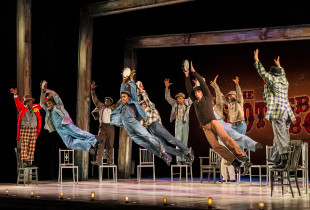Stage Manager
A stage manager works with a director and other artists to keep a production organized and on schedule. They help to run rehearsals, making sure artists take breaks and know when to arrive and what to prepare. When a production opens, the stage manager communicates with the team to keep people on schedule, pass on any notes from the director, and make sure the production continues as the director and designers envisioned. The stage manager has to have an understanding of design and technical theatre, as they "call the show" by telling the technicians when to change the lighting, sound, scenery, and other design elements. They are usually employed by a theatre on a per-show contract basis, although some theatres utilize the same stage managers for every production. Stage managers often have degrees in technical theatre or production, although you can major in stage management at some colleges and universities.
About the Video: Ross Jackson, Stage Manager
How does a production remain consistent from one night to the next? Who do the actors call when they’re stuck in traffic on the way to the theatre? Who reports back to the director and company night after night deep into a run? The answer to all these questions—and many more—is the stage manager. Ross Jackson, who got his start as a stage management intern for Wicked on Broadway, explains what it takes to be the person in the booth at every performance, calling the cues and maintaining the artistic integrity of the show.
Resources & More Information
- The Stage Managers' Association is a good place to start, with resources like Ask a Stage Manager, which sends your questions to experienced professional stage managers.
- Stage managers are eligible to become part of Actors' Equity Association.
Related Links
What's Your Theatre Career Path?
If you’re curious about careers in theatre and wondering which ones might be right for you, we’ve created a quick quiz to help you think about the type of job you might want within the arts and what kind of lifestyle and education that career path requires.
Take the Quiz
